★★★
“There are bad people in the world and they shouldn’t be around the good people, especially the little ones,”
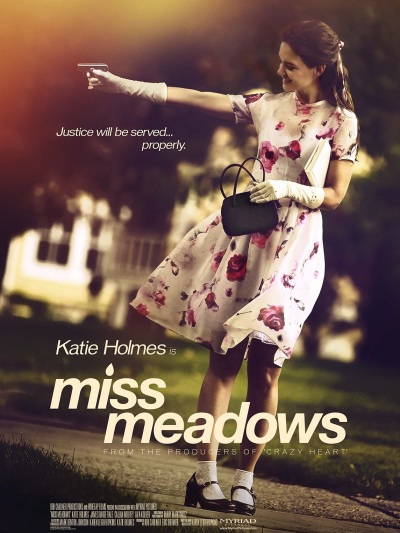 A young woman is walking down the street. A truck pulls up alongside her, and the driver starts talking to her, at first nicely, but gradually more crudely. When she spurns his advances, he pulls a gun. However, the woman pulls her own weapon from her handbag and shoots him dead. Welcome to the world of Miss Meadows (Holmes), where bad behaviour is countered with lethal force. It’s an offshoot of the “urban vigilante” film, where someone goes off the rails in response to rudeness and the perceived failures of modern culture, rather than a direct threat. Falling Down was perhaps the first example, also seen in Bobcat Goldthwait’s God Bless America. Both those were rather more acerbic than this, gynocentric entry, which perhaps has more in common with John Waters’ Serial Mom. At one point, a cop calls Miss Meadows a “Pulp Fiction Mary Poppins,” and that’s a fairly accurate high-concept here.
A young woman is walking down the street. A truck pulls up alongside her, and the driver starts talking to her, at first nicely, but gradually more crudely. When she spurns his advances, he pulls a gun. However, the woman pulls her own weapon from her handbag and shoots him dead. Welcome to the world of Miss Meadows (Holmes), where bad behaviour is countered with lethal force. It’s an offshoot of the “urban vigilante” film, where someone goes off the rails in response to rudeness and the perceived failures of modern culture, rather than a direct threat. Falling Down was perhaps the first example, also seen in Bobcat Goldthwait’s God Bless America. Both those were rather more acerbic than this, gynocentric entry, which perhaps has more in common with John Waters’ Serial Mom. At one point, a cop calls Miss Meadows a “Pulp Fiction Mary Poppins,” and that’s a fairly accurate high-concept here.
She’s a somewhat nomadic first-grade substitute teacher, with a past which clearly contained a defining trauma, who has long phone calls with her mother (Smart), and seeks to protect her local community from an influx of criminal elements. But when she meets and falls for a cop (Dale), who gradually realizes the woman he’s seeing may also be the killer his colleagues are hunting. And he’s not the only person who discovers the secret behind her facade. Meadows is an wonderful and engaging concoction, a throwback to an earlier era of politeness and courtesy, and its that contrast to her ruthless approach, tap-dancing her way to mass murder, that drives the film. It’s not entirely successful; the storyline, overall, relies too much on good fortune and convenience [every fast-food restaurant I’ve been in has surveillance cameras; the one here, not so much], and also tends to the obvious – a priest who molests children, there’s a shocker. It would make for a far ‘edgier’ film, if there was more grey involved in her targets, even at the risk of losing some of the audience. Killing paedophiles and murderers is an easy option, weakening the moral dilemma posed here.
But I thoroughly enjoyed Holmes’s performance; I hadn’t seen her in anything since Thank You for Smoking, back in 2005, before she became most famous for being Mrs. Tom Cruise. She takes a character that possesses two distinct, largely-opposing aspects, and nails it: Miss Meadows is, at once, charming and, clearly, barking mad, with a grip on reality that, we discover, may be a great deal looser than it initially appears. Concentrating more on these psychological aspects – perhaps instead of the rather implausible romantic angle – might have boosted this film out of the “quirkily forgettable” niche into which it is instead dropped.
Dir: Karen Leigh Hopkins
Star: Katie Holmes, James Badge Dale, Callan Mulvey, Jean Smart







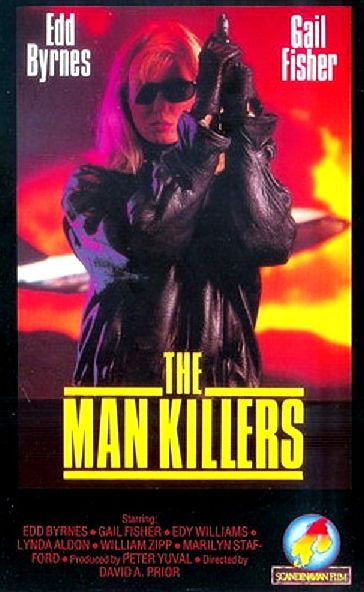


 This idea seems insane on the surface: take one of the classic villainesses of all-time, and tell the story from her point of view? How could that possibly work? But then, you think about it a bit, and the possibilities become apparent – not just in the fairytale arena, but in others as well. What about a Bond movie from the perspective of Goldfinger? A horror movie through Freddy Krueger’s eyes? One of the first things you realize, is that casting is particularly key: here, you need to have a lead who can take a character that has been universally loathed by generations, to the point where it’s in our cultural DNA, and turn it around, to become the sympathetic focus. The other essential aspect is the motivation: what happened to make them the way they are, and justify their subsequent “evil” actions? You have to bring the audience along on that character’s journey – and, bear in mind, this is a Disney film, so the scope for any kind of explicit content is close to nil. Yeah, we were right the first time, there’s no way this will ever succe…
This idea seems insane on the surface: take one of the classic villainesses of all-time, and tell the story from her point of view? How could that possibly work? But then, you think about it a bit, and the possibilities become apparent – not just in the fairytale arena, but in others as well. What about a Bond movie from the perspective of Goldfinger? A horror movie through Freddy Krueger’s eyes? One of the first things you realize, is that casting is particularly key: here, you need to have a lead who can take a character that has been universally loathed by generations, to the point where it’s in our cultural DNA, and turn it around, to become the sympathetic focus. The other essential aspect is the motivation: what happened to make them the way they are, and justify their subsequent “evil” actions? You have to bring the audience along on that character’s journey – and, bear in mind, this is a Disney film, so the scope for any kind of explicit content is close to nil. Yeah, we were right the first time, there’s no way this will ever succe…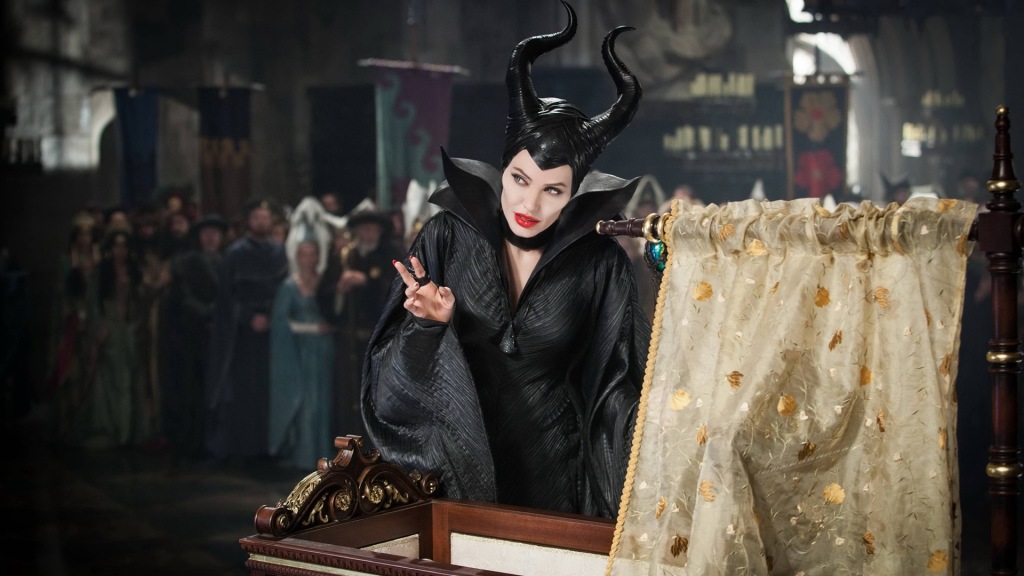 Except, there’s one very significant twist. Chris and I took a pie break an hour in, and she complained the film’s direction was “obvious.” Yes… and no. It was clearly pointing in the Prince Charming and happy ever after directions, but I’m delighted to report this is then subverted into something entirely different, and which packs a much greater emotional wallop. There was sniffling coming from beside me on the couch before the end, let’s just leave it at that. If there’s a Disney moral to be found in the (mostly awesome) ending, it’s perhaps not just the value of forgiveness over revenge, but that when someone offers you the former, it’s often wisest just to take it. Oh, and another important lesson: if you go plummeting off battlements with a creature that has wings and can fly, there’s really only going to be one loser in that scenario.
Except, there’s one very significant twist. Chris and I took a pie break an hour in, and she complained the film’s direction was “obvious.” Yes… and no. It was clearly pointing in the Prince Charming and happy ever after directions, but I’m delighted to report this is then subverted into something entirely different, and which packs a much greater emotional wallop. There was sniffling coming from beside me on the couch before the end, let’s just leave it at that. If there’s a Disney moral to be found in the (mostly awesome) ending, it’s perhaps not just the value of forgiveness over revenge, but that when someone offers you the former, it’s often wisest just to take it. Oh, and another important lesson: if you go plummeting off battlements with a creature that has wings and can fly, there’s really only going to be one loser in that scenario.

















 And Frankenstein Created Woman? That might have been an alternate title, with German scientist Dr. Serafin (Jurgens) in the role of the creator – he’s a man with a dubious past, and whispers of involvement in Nazi experimentation. Now “rehabilitated” to the US, in what may be a medical version of Operation Paper Clip, he uses an unholy mix of pharmaceuticals and extreme training methods to convert his own daughter, Goldine, into a 6’2″ athletic superwoman, with the aim of completing an unheard of triple crown at the upcoming Moscow Olympics, winning the 100, 200 and 400 metre gold medals. To fund this work, he brings in a consortium of businessmen who aim to capitalize on Goldine’s success with advertising, merchandising, etc. Brought in to advise them, as Goldine is prepared for her first public events, is agent Jack Dryden (Coburn), who gradually realizes the one person not wholeheartedly committed to the entire proceedings, is the runner herself.
And Frankenstein Created Woman? That might have been an alternate title, with German scientist Dr. Serafin (Jurgens) in the role of the creator – he’s a man with a dubious past, and whispers of involvement in Nazi experimentation. Now “rehabilitated” to the US, in what may be a medical version of Operation Paper Clip, he uses an unholy mix of pharmaceuticals and extreme training methods to convert his own daughter, Goldine, into a 6’2″ athletic superwoman, with the aim of completing an unheard of triple crown at the upcoming Moscow Olympics, winning the 100, 200 and 400 metre gold medals. To fund this work, he brings in a consortium of businessmen who aim to capitalize on Goldine’s success with advertising, merchandising, etc. Brought in to advise them, as Goldine is prepared for her first public events, is agent Jack Dryden (Coburn), who gradually realizes the one person not wholeheartedly committed to the entire proceedings, is the runner herself. This review is more in the nature of a warning than a critique, since it would be easy for someone to look at the cover (right) and think that this might be a movie about – oh, I dunno, boxing? It seems a reasonable expectation, given the following synopsis:
This review is more in the nature of a warning than a critique, since it would be easy for someone to look at the cover (right) and think that this might be a movie about – oh, I dunno, boxing? It seems a reasonable expectation, given the following synopsis: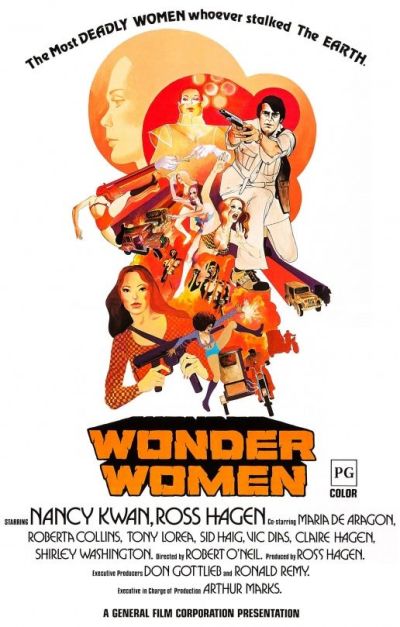 Roger Corman’s New World Pictures weren’t the only ones using the Philippines as a factory to churn out B-movies in the seventies, as this 1973 entry, from Arthur Marks’ General Film Corproration shows. Dr. Tsu (Kwan) and her posse of henchwomen are kidnapping athletes, the not-so-good doctor having perfected the ability to do brain transplants. She’s now selling this as a service to rich, old people, who can become young again. However, after kidnapping a jai-alai star, the insurance company on the hook for the half million dollar policy hires Mike Harber (Hagen) to investigate. As he starts nosing around and making waves, first the local gangster boss, then Dr. Tsu, send their minions out to stop him. Needless to say, this is of limited success, and he is soon on his way to the remote island where Tsu operates, to take down her operation.
Roger Corman’s New World Pictures weren’t the only ones using the Philippines as a factory to churn out B-movies in the seventies, as this 1973 entry, from Arthur Marks’ General Film Corproration shows. Dr. Tsu (Kwan) and her posse of henchwomen are kidnapping athletes, the not-so-good doctor having perfected the ability to do brain transplants. She’s now selling this as a service to rich, old people, who can become young again. However, after kidnapping a jai-alai star, the insurance company on the hook for the half million dollar policy hires Mike Harber (Hagen) to investigate. As he starts nosing around and making waves, first the local gangster boss, then Dr. Tsu, send their minions out to stop him. Needless to say, this is of limited success, and he is soon on his way to the remote island where Tsu operates, to take down her operation.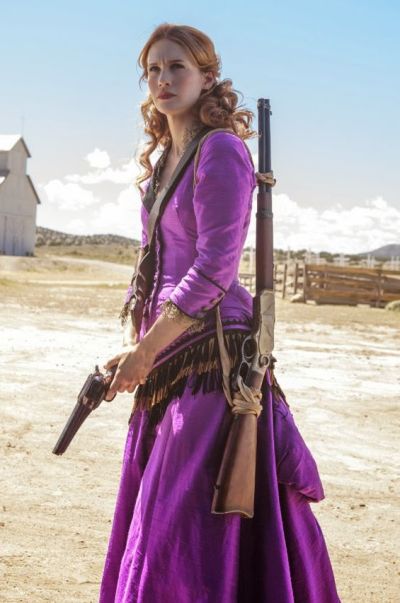 Life in the old West was tough. It was particularly tough if you were a woman, such as Sarah Ramírez (Jones), struggling to make an honest living with her farmer husband Miguel (Noriega), having escaped life as a prostitute. This movie shows it to be especially tough, after Miguel has had his throat slit by batty preacher Prophet Josiah (Isaacs) – it doesn’t help he has the hots for Sarah, apparently taking the “love thy neighbour” line very literally, and runs the local area as if it were his own personal fiefdom. Fortunately, she has an unusual ally in Sheriff Jackson (Harris). The lawman shows up, looking for two people who disappeared on a journey which took them right across Josiah’s territory, and is about the only other person willing to stand up to the lunatic religious fringe. Finally, Sarah has had enough, and embarks on her vengeance against, not only Josiah, but anyone else who has wronged her, such as the shopkeeper who spied on her in his changing-room.
Life in the old West was tough. It was particularly tough if you were a woman, such as Sarah Ramírez (Jones), struggling to make an honest living with her farmer husband Miguel (Noriega), having escaped life as a prostitute. This movie shows it to be especially tough, after Miguel has had his throat slit by batty preacher Prophet Josiah (Isaacs) – it doesn’t help he has the hots for Sarah, apparently taking the “love thy neighbour” line very literally, and runs the local area as if it were his own personal fiefdom. Fortunately, she has an unusual ally in Sheriff Jackson (Harris). The lawman shows up, looking for two people who disappeared on a journey which took them right across Josiah’s territory, and is about the only other person willing to stand up to the lunatic religious fringe. Finally, Sarah has had enough, and embarks on her vengeance against, not only Josiah, but anyone else who has wronged her, such as the shopkeeper who spied on her in his changing-room.









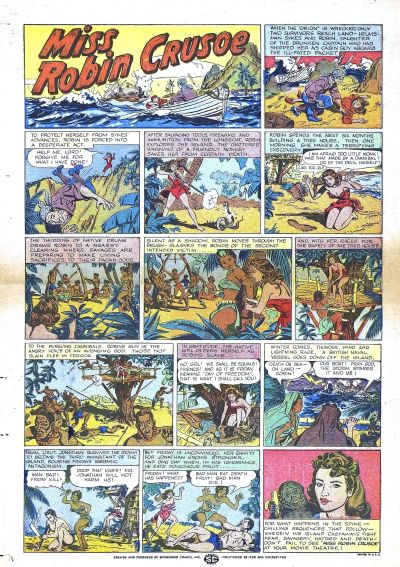
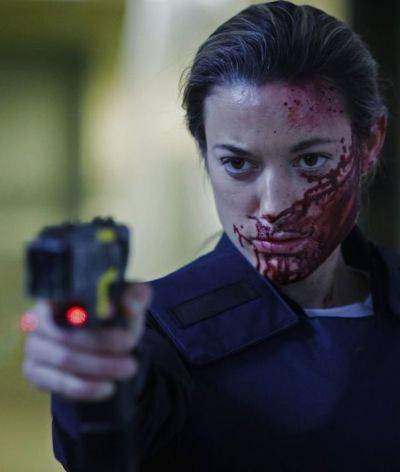
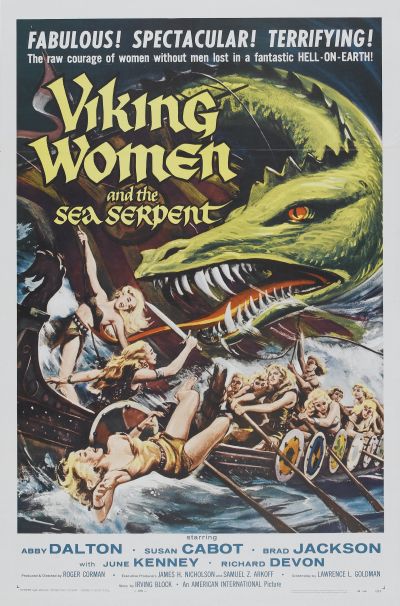 I can see why, purely for reason of brevity, the title above was preferred to the full one of The Saga of the Viking Women and Their Voyage to the Waters of the Great Sea Serpent, even though the latter is more accurate. For the Sea Serpent has a supporting role here, met once on their way in, and again on the way out – it’s much more about what happens in the middle. Three years after their men left, the women of the Stannjold clan leave their shores under the command of Desir (Dalton), trying to find out what happened to them. Encounter #1 with the monster leads them to be shipwrecked on the same shores of the Grimault tribe as their menfolk, whose king, Stark (Devon), has set them to work as slaves in his mines. After initially appearing to welcome the women, it becomes clear that Stark has plans for the new arrivals as well. Viking high-priestess Enger (Cabot) has her own agenda, however: having set her eyes both on Desir’s husband and, for more immediate and pragmatic reasons, Stark, she sabotages Desir’s first attempt to free the men.
I can see why, purely for reason of brevity, the title above was preferred to the full one of The Saga of the Viking Women and Their Voyage to the Waters of the Great Sea Serpent, even though the latter is more accurate. For the Sea Serpent has a supporting role here, met once on their way in, and again on the way out – it’s much more about what happens in the middle. Three years after their men left, the women of the Stannjold clan leave their shores under the command of Desir (Dalton), trying to find out what happened to them. Encounter #1 with the monster leads them to be shipwrecked on the same shores of the Grimault tribe as their menfolk, whose king, Stark (Devon), has set them to work as slaves in his mines. After initially appearing to welcome the women, it becomes clear that Stark has plans for the new arrivals as well. Viking high-priestess Enger (Cabot) has her own agenda, however: having set her eyes both on Desir’s husband and, for more immediate and pragmatic reasons, Stark, she sabotages Desir’s first attempt to free the men.